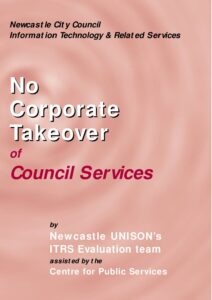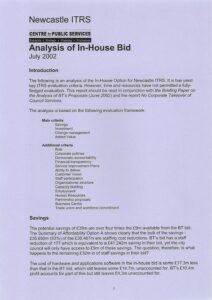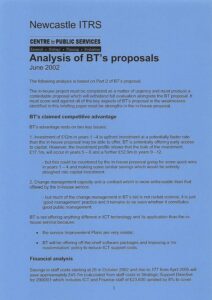The City Council decided not to proceed with a Strategic Partnership for ICT and related services following a procurement process and to undertake the work in-house. No Corporate Takeover of Council Services is by Newcastle’s UNISON’s ITRS Evaluation Team assisted by the Centre for Public Services. Part 1: In-House Capacity for Change Management – makes the case for an in-house solution. Part 2: BT Performance – describes the company’s strategic blunders, outsourcing and investment record in the North East region.
In 2001 Newcastle City Council began a procurement process for ICT and corporate services. UNISON began a series of briefings to Councillors making the case against outsourcing and the failures private contractors and workplace meetings. Following industrial action, the Labour Group agreed that an in-house bid should be prepared. A series of workshops involved senior management, staff and trade unions examined how services could be improved, reorganised together with new ICT systems. The Council gave a commitment to fully engage with staff in the affected services and to involve trade unions. An in-house bid was prepared by a group of senior officers.
A team of ten shop stewards from the affected services held a day-long evaluation of the BT proposals with the Centre for Public Services (Centre for Public Services, 2002). In September 2002, the City Council Cabinet accepted a £250m ten-year Information Technology and Related Services (ITRS) in-house bid and rejected a bid from BT, which included a proposal for a joint venture company with the City Council (Centre for Public Services, 2002). The in-house option was chosen because it gave better value for money, provided the same investment at lower cost with virtually the same Service Improvement Plan, required fewer job losses, demonstrated it could achieve the required changes and contained a commitment and cooperation from staff and trade unions to in-house transformation.
A new division, City Service, was created and has since successfully transformed ICT and corporate services and achieved the required savings. It now forms the core of a council-wide transformation strategy. Staff and trade unions have been engaged in the design, planning and implementation of each service improvement initiative and the introduction of new ICT systems (Wainwright and Little, 2009). A retraining and redeployment strategy meant there were no compulsory redundancies.
City Service successfully bid for and implemented the Information and Communications Technology £16.5m contract for the City Council’s Building Schools for the Future PFI contract in 2006. In the first five years City Service achieved net savings of £28.5m, projected forward over an 11-year period. Additional savings have been achieved.




